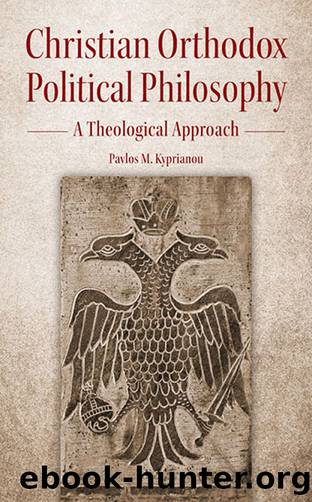Christian Orthodox Political Philosophy by Pavlos M. Kyprianou

Author:Pavlos M. Kyprianou
Language: eng
Format: epub
ISBN: 9781942699538
Publisher: Holy Trinity Publications
Church and National Symbols
A local Orthodox Church is associated with the nation (or nations) residing within the territory of the state in which she is located, but at the same time she extends her hand to other nations. The use of national symbols by the Church may unite compatriots, but it can also create a wall separating her from foreigners. It may render the Church âoursânot yours,â instead of âours so that it can become yours as well.â It is good and necessary for the Church to be part of national identity, not in order to submit to the nation, but for the purpose of enriching and substantiating it, and giving it an ecumenical (apart from a heavenly and eternal) mission. Bearing in mind this ecumenical perspective, it is perfectly foreseeable that the sight of national symbols in or around a Church may deter instead of attract people of other nationalities who may have otherwise been interested in being baptized Orthodox, feeling that they may not be welcome, or may not feel comfortable within a ânationalâ Church of a foreign nation.
Even worse is the presence of national symbols when, at the same time, they are not state symbols (i.e., local), but have a âsupra-stateâ character, as for example in the case of Cyprus. While the state and ecclesiastical boundaries of the Republic of Cyprus and the Church of Cyprus coincide, nevertheless the vast majority of the churches of Cyprus display in their precinct flags of the Greek nation (in the absence of the flag of Cyprus) thus indirectly giving, in our view, the following message: âThe local (Cyprocentric) identification and semanticization of the Church of Cyprus is not sufficient for us, we also need the Greek (âsupra-stateâ) national flag to strengthen our (church) identity.â The Church of Cyprus, however, bears a local identification as the Church of Cyprus and has been enjoying the privilege of autocephaly for 1,600 years.225 Why then does Cyprus need as a label the national Greek flag, which is much more recent (around two centuries old), to strengthen its identity, given that this identity is already powerful and beyond doubt? The negation of the local character of the Church for the sake of a national one constitutes heresy (of ethnophyletism) according to the Great Local Synod that took place in Constantinople in 1872 in which the Archbishop of Cyprus Sophronios also participated. Of course, we are not claiming that the use of the Greek flag by the churches of Cyprus constitutes heresy. But it is an unnecessary feature which gives the impression of bypassing locality (which is a prerequisite of communion) and moving toward ethnophyletism (which is indicative of ideologicization and, as such, contradicts communion). The display of the Greek flag could be avoided, or at least be displayed along with the flag of the Cypriot state next to it, in order to offer a local (âstate-centeredâ) and communal counterweight and âanchorâ preventing this movement toward nationalization and ideologicization symbolized and promoted by the use of
Download
This site does not store any files on its server. We only index and link to content provided by other sites. Please contact the content providers to delete copyright contents if any and email us, we'll remove relevant links or contents immediately.
Under the Banner of Heaven: A Story of Violent Faith by Jon Krakauer(1787)
The Early Centuries - Byzantium 01 by John Julius Norwich(1727)
The Amish by Steven M. Nolt(1560)
Taken by J. C. Owens(1554)
In Spirit and Truth (In Spiritu Et Veritate Series) by Reed Zoe(1542)
Play It as It Lays by Joan Didion(1500)
The Apogee - Byzantium 02 by John Julius Norwich(1434)
The Last Man in Russia by Oliver Bullough(1387)
David Sedaris Diaries by David Sedaris(1283)
A History of the Amish by Steven M. Nolt(1274)
The Dance of Change by unknow(1250)
Leaving the Witness by Amber Scorah(1245)
Fallen by unknow(1207)
Tears of the Silenced: A True Crime and an American Tragedy; Severe Child Abuse and Leaving the Amish by Misty Griffin(1191)
The Angel of Forest Hill by Cindy Woodsmall(1139)
Deep Blue by unknow(1135)
The Best of Amish Cooking by Phyllis Pellman Good(1131)
The Ariana Trilogy by Rachel Ann Nunes(1117)
Escape by Carolyn Jessop & Laura Palmer(1102)
